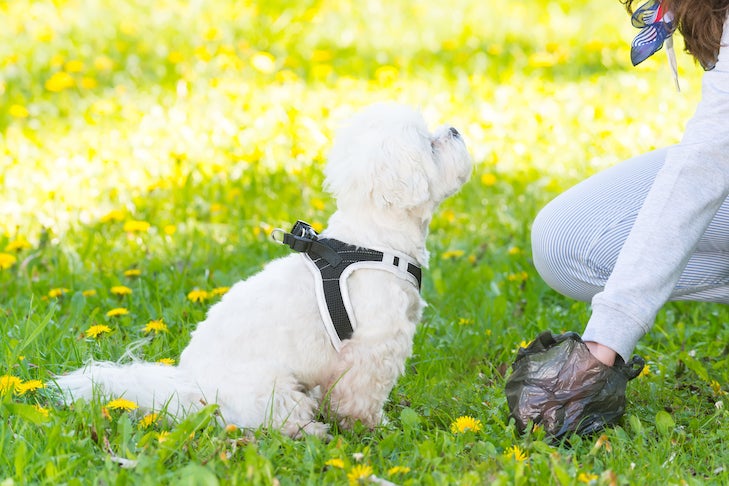AKC is a participant in affiliate advertising programs designed to provide a means for sites to earn advertising fees by advertising and linking to akc.org. If you purchase a product through this article, we may receive a portion of the sale.
Dealing with dog poop isn’t the best part of being a dog owner. But a veterinarian might ask you to bring a sample of your dog’s poop to the office for a dog fecal exam. If they do, it’s helpful to understand the purpose of a dog fecal test and why your vet is asking you to bring it in.
What Is a Fecal Test For Dogs?
During a dog fecal test, a vet examines a canine stool sample under a microscope. This can help the vet determine if a dog has intestinal parasites like worms (such as hookworms, ringworms, or roundworms) or non-worm parasites (like giardia). Parasites are not visible in your dog’s stool, as they remain inside the dog’s body to survive. Worms shed eggs only detectable under a microscope, while non-worm parasites don’t shed eggs. “Fecal testing can help detect the eggs of parasites such as coccidia, roundworms, hookworms, and whipworms,” says Dr. Vardui Khorikyan, DVM, at Rose City Veterinary Hospital in Pasadena, California.

Some signs of intestinal parasites include:
- Coughing
- Diarrhea
- Vomiting
- Lethargy
- Dull coat
- Weight loss
- Mucus or blood in stool
- Distended (outwardly swollen) abdomen, especially in puppies
While uncommon, coughing is also a sign of roundworms in dogs. If your dog is experiencing these symptoms, always consult your vet.
How Does a Fecal Test Work?
To test a dog’s feces, the vet or veterinary technician can choose between several methods to look for parasite eggs. “The most common method is fecal flotation,” Dr. Khorikyan says. This test is easy to perform, with the least amount of steps and equipment required. In this 20-minute test, the stool is mixed in a solution and strained. This allows the eggs to float to the surface and become visible under the microscope. Using this method alone can be unreliable when diagnosing parasites, according to the Companion Animal Parasite Council.
A more reliable test is fecal centrifugation. The stool is mixed with a solution and placed in a centrifuge, which spins the sample and allows the eggs to float to the top. The top layer is skimmed and examined under a microscope. The CAPC maintains that this method is more reliable because centrifugation involves spinning all the eggs and letting them float to the top, regardless of their density.

False negatives may happen with dog fecal tests, including fecal flotation tests. “Some factors, such as the parasite’s life cycle and consistency of a stool sample, can increase the chances of a false negative result,” Dr. Khorikyan says. “You may need to repeat the test.”
Antigen testing is the most sensitive detection method. Performed at an outside laboratory, it’s usually more expensive than a basic fecal flotation test. The antigen test detects antigens, or special proteins produced by parasites, even if parasite eggs are not contained in the stool sample. Combined with fecal centrifugation and flotation, this method detects the presence of parasites, whether or not the parasites are producing eggs, or if there are eggs present in the sample.
Your vet may also examine your dog’s feces under a microscope, in what is called a fecal smear. They may use a fecal smear to diagnose giardia, for example.
How Often Should My Dog Get a Fecal Test?
“For adult dogs who are not experiencing a health issue, veterinarians recommend a routine fecal exam every six to 12 months,” says Dr. Khorikyan. “Puppies are more susceptible to parasites and should have a fecal test more frequently.”
The CAPC recommends testing for internal parasites at least four times a year in puppies and at least twice a year in adult dogs, but that depends on your dog’s health and lifestyle. Ask your vet how often they would recommend a fecal test for your pet.
How to Collect Your Dog’s Poop For a Fecal Test
When the vet examines your dog’s feces, they may ask you to bring in a fresh stool sample. If this is the case, the vet will tell you how much to bring in. It’s likely you’ll only need to bring a small amount since fecal exams also only look at about a teaspoon of dog poop.
Alternatively, your vet may obtain a fecal sample from your dog with a rectal examination. This procedure can be uncomfortable for a dog, so ask your vet which option they would recommend.
If your vet asks you to collect a stool sample, make sure it’s one that your dog deposited within the past 12 hours. The easiest way to collect a stool sample is to take your dog out after they’ve had a meal, ideally about an hour before your trip to the vet’s office. Then, take your dog for a walk, bring a collection container with you, and collect a sample once they poop.

Here’s how to collect it:
- Use a pooper scooper to pick up a sample. You can pick up a sample using your hand if you wear a disposable plastic glove. You can also put your gloved hand into a plastic poop bag, scoop up the sample, turn the bag inside out, and place it inside another plastic bag or a container.
- Once you’ve collected the sample, place the small amount of new feces inside a clean, empty container with a snug-fitting lid. A small cottage cheese or yogurt carton works well.
- Cover the container securely. Mark the top of the container with your dog’s name, your name, and the sample’s collection date.
- If you can’t bring it to the veterinarian’s office immediately, keep the sample in the refrigerator (away from food and drink). It can remain refrigerated for 12 to 24 hours.
- While it’s best to refrigerate the sample, you can to it unrefrigerated in a cool place for up to eight hours, which prevents the eggs from hatching. Once they hatch, the sample cannot be analyzed.
- Always wash your hands after gathering a sample.
- To transport the sealed container, place it in a bag and drop it off at the vet. Once you get home, be sure to thoroughly disinfect the area in the fridge where the container was located.
This article is intended solely as general guidance, and does not constitute health or other professional advice. Individual situations and applicable laws vary by jurisdiction, and you are encouraged to obtain appropriate advice from qualified professionals in the applicable jurisdictions. We make no representations or warranties concerning any course of action taken by any person following or otherwise using the information offered or provided in this article, including any such information associated with and provided in connection with third-party products, and we will not be liable for any direct, indirect, consequential, special, exemplary or other damages that may result, including but not limited to economic loss, injury, illness or death.

